Switching over to natural cleaners is one of the best things you can do for your home. It’s an easy way to eliminate unnecessary toxins from your cleaning routine once you have what you need. Here’s a list of 5 natural cleaning ingredients to help get you started on your green cleaning journey!
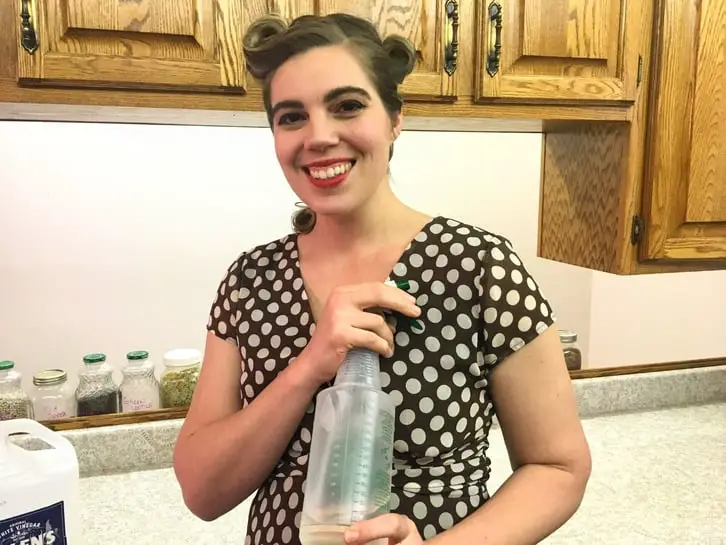
WHY SHOULD I START USING NATURAL CLEANING INGREDIENTS?
Whether we want to admit it or not, we are surrounded by all kinds of toxins.
It’s not just what we eat (that’s a huge part of it, though), it’s everything we expose ourselves to.
The personal care products, the plastic, the wifi… Then there are the commercial cleaners we keep under the sink.
The way I look at it, anything that gets a huge marketing and advertising budget is something I should stay away from.
Do you want to know why?
Here in Canada, 1 in 2 Canadians is expected to be diagnosed with cancer in their lifetime. In the States, the CDC reported that allergies in children increased significantly between 1997-2011.
Then there are the growing numbers of people being diagnosed with conditions like Alzheimer’s, Multiple Sclerosis, heart disease, and infertility amongst others.
Before you scourge me, I am not saying these problems are caused by what you clean your home with. Changing what you clean your home with, however, is an easy way to become more conscious of what you invite into your life.
Switching to natural cleaners is a good first step to reducing the toxins you’re exposing yourself and your family to.
5 NATURAL CLEANING INGREDIENTS VIDEO
Each post I write has a video to go with it. If you like what you see, I hope you’ll subscribe to my YouTube channel!
This post may contain affiliate links, meaning that if you choose to purchase something after clicking on one of the links in this post, I may earn a small commission at no additional cost to you.
RELATED: How to Clean Your Home With the FlyLady App
A DISCLAIMER
Today I’ll be going over 5 natural ingredients that you can start using to clean your home with instead of commercial cleaners. I am not giving you recipes for DIY cleaners.
Not in this article anyway.
If that is something you’re looking for, I have a free ebook available with 10 easy DIY cleaners to make with these ingredients.
There’s also this post on oven cleaning and this other one on fridge cleaning that leverages some of the 5 natural cleaning ingredients.
THE 5 NATURAL CLEANING INGREDIENTS
Without any further ado, let’s dive in! How many of these do you already have on hand?
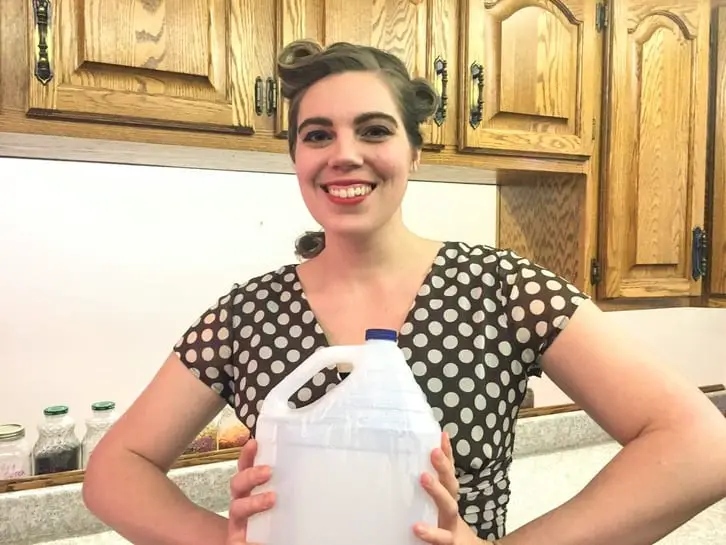
VINEGAR
It might not surprise you to spot vinegar on the list.
Vinegar has long been valued for its cleaning power and is a true vintage cleaning ingredient.
Boasting antimicrobial properties, it can be used as a disinfectant. For example, instead of wiping baby toys down with a wipe that kills 99.9% of bacteria, spray them down with vinegar.
As vinegar evaporates, the smell goes away, so don’t worry about your home smelling like salad dressing.
Moreover, vinegar is biodegradable and it’s cheap.
Use it to clean windows and mirrors. Run a vinegar cycle through your coffee maker or dishwasher to eliminate mildew. Add it to your mop water (this doesn’t work for me, but others swear by it); clean your counters, and put it to work in the bathroom.
Vinegar is a key ingredient in my all-purpose spray and in my toilet bowl cleaner (check out the ebook!). You have some on hand, right?
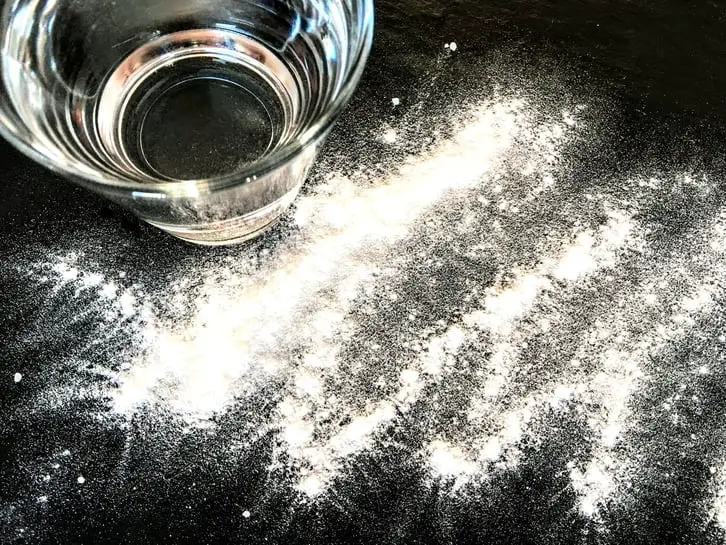
BAKING SODA
Baking soda, where would I be without you?
Out of the 5 natural cleaning ingredients listed here, this one is my favourite.
For one thing, baking soda has antibacterial properties, which is why it’s so good at deodorizing.
Open up a box every month to store in your fridge or freezer and it will absorb any funky odours. Sprinkle it on cutting boards after you get done chopping an onion.
Have a stain in your oven? Mix it with a bit of water to make a paste and let it sit for a minimum of twenty minutes before scrubbing it off.
Baking soda is a gentle abrasive, so it’s great for scouring those dishes you’re tempted to let soak.
I use baking soda (and vinegar) to clean produce.
To give my dishwasher a boost (and to deodorize it in between loads), I sprinkle a bit on the bottom.
Use baking soda to unclog a lazy drain, clean the toilet, and shine up stainless steel.
There’s no shortage of ways baking soda can be used to clean your home! How do you like using baking soda outside of baking?
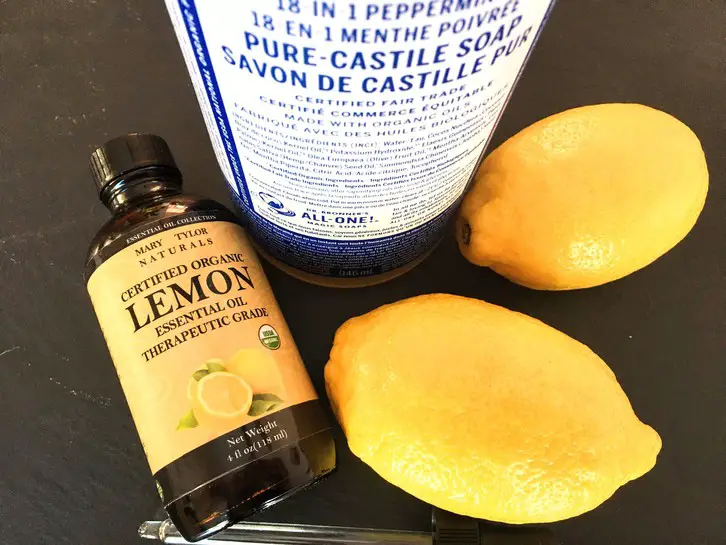
CASTILE SOAP
I first started using castile soap for cosmetic purposes. I would pour a bit of Dr. Bronner’s peppermint castile soap in a sink full of hot water to give myself an invigorating hot body scrub.
Body wash and hand soap were (and still are) two other items I make with this crucial cleaning product. It took me a while to start cleaning with it, but once I understood how to incorporate it into my cleaning routine, it’s become invaluable.
Dr. Bronners is my go-to brand when it comes to castile soap because its ingredients are organic and fair trade. When I’m using essential oils, I prefer their unscented version, but I adore the peppermint. They also have tea tree, lavender, and an almond one that I love.
Castile soap is a plant-based product that’s biodegradable and toxin-free.
It can be a bit pricy, but it’s not too bad when you buy it in bulk. I’ve seen it available at lower prices, but after looking at the ingredient label, I can usually understand why: you get what you pay for!
I primarily use castile soap to clean my floors. Mixed with baking soda and essential oils, it makes a lovely soft scrub for cleaning sinks and bathtubs. Some people use it to make dish soap, run it through their dishwasher, and wash laundry with it.
WOOL DRYER BALLS
Laundry is one of those areas that are full of toxic chemicals.
I’m not even going to touch on the Tide Pod challenge of 2019, but that phenomenon just went to show that millions of folks are washing their family’s laundry with poison.
I make my own natural laundry soap on the cheap, but what I really want to tell you about are wool dryer balls.
No, they’re not really an ingredient, but they do help in my quest to eliminate as many cleaning-related toxins as I can.
Now, I used to love dryer sheets. I swore by them, even. My mom always insisted on dryer sheets and so did I. When I was putting clothes away for the season, the bin would get a dryer sheet. Putting guest bed sheets away? Tucking in a dryer sheet would keep them smelling fresh.
Unfortunately, dryer sheets are full of toxins I’d rather not be exposed to.
A couple of years ago I decided to try wool dryer balls. They’re supposed to reduce drying time because they bounce around in the load creating pockets for the air to circulate through. They also reduce static and have a long life, anywhere from 2-4 years depending on how much laundry you’re doing.
I’ve had my dryer balls for two years now and they’re still going strong.
I imagine I would have gone through at least six or seven boxes of dryer sheets in that time frame, so I’ve easily recouped my investment.
Plus, I can still impart a lovely light fragrance on my laundry by dropping a couple of drops of essential oil on each ball. Lavender and grapefruit are my favourite scents for laundry, and you know what? My clothes smell so much better as a result because they’re free from chemical fragrances!
ESSENTIAL OILS
Lastly, we have essential oils. Essential oils are a huge subject and I still have so much to learn about them.
I am a novice when it comes to essential oils, but I swear by them in my natural cleaning products.
Since I mostly use essential oils for cleaning and diffusing at this point, I’m not too worried about their quality.
For topical and ingestive purposes, quality is important, and that’s where essential oils start to become expensive. I’m sure there are a number of other oils that are terrific cleaners, but these are the ones I use all the time.
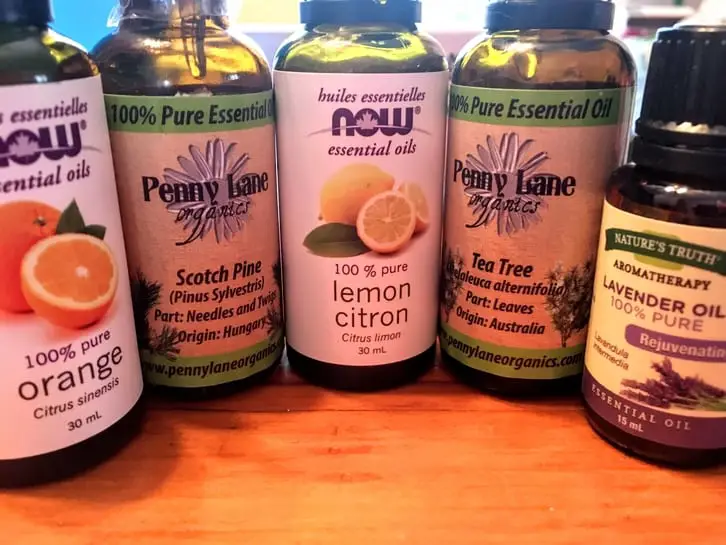
LEMON
I love lemon essential oil for its antibacterial and degreasing properties.
It’s refreshing, energizing, and is also antiseptic.
To freshen kitchen sponges and rags, pour boiling water over them and add a few drops of lemon along with baking soda or vinegar.
When making a wood polish, I use lemon for its scent. Another way lemon can be employed is by adding some to a load of laundry.
Not only will the load smell great, but it will also disinfect your washing machine at the same time!
TEA TREE
This is one oil that packs a powerful punch.
It has a number of antibacterial, anti-fungal, and sanitizing properties.
Similar to lemon essential oil, it can be added to the wash to not only boost the load but to disinfect the machine.
Use tea tree oil to attack mould and mildew.
Add it to a diffuser to purify the air.
Disinfect the sink; clean sponges and brushes, and get your counters with it.
One thing to note is that it shouldn’t be used on natural stone counters as it will erode the stone.
SCOTCH PINE
One of my favourite chemical cleaners back in the day used to reek of fake pine. I loved using it on my floors, but those days are gone.
Today, I use scotch pine essential oil when I want my floors to smell like fresh pine. I also use it when I’m cleaning my toilet.
LAVENDER
Lavender has all kinds of antibacterial properties, but I don’t know very much about its disinfecting power.
In my cleaning, I mostly use it for aromatic purposes, so I’ll dab it on my wool dryer balls when doing laundry.
Sometimes I’ll add it to the soft scrub I make for the bathroom, or when I’m making laundry soap. Do you like lavender, too?
A BONUS INGREDIENT: RUBBING ALCOHOL
I don’t know when we became obsessed with sterility, but it’s come to a point where many folks are terrified of their own germs.
I cringe when someone pulls hand sanitizer out of their purse instead of going to the bathroom to wash their hands with soap and water. It’s something I used to do, too, but that’s before I learned about the negative impact these sanitizers have on our immune systems.
Still, sterility is important in the medical field and when food is being handled. This is why the 5 natural cleaning ingredients listed above aren’t enough.
At the end of the day, you will still need something in your arsenal that can kill pathogens like salmonella.
While tea tree oil makes a wonderful antibacterial ally, it doesn’t kill everything.
To cover all of your bases, keep rubbing alcohol on hand to disinfect your counters after handling raw meat.
I didn’t include it in the list of 5 natural ingredients because it’s synthetic alcohol. It’s a better disinfectant than vodka, though, and cheaper too, so there you are.
5 NATURAL CLEANING INGREDIENTS FEEDBACK
I could probably keep going on and on about the virtues of cleaning with natural products. When it comes to the chemical cleaning industry, I can get a bit vitriolic, so I did my best to curb myself, I swear!
In any case, I’d like to hear from you now! What do you like cleaning your home with? Do you swear by chemical cleaners? Are you trying to make the switch and don’t know where to start?
If you’re in the latter group, I suggest starting small and slowly work your way up. Dryer balls were the first step for me; what will be yours? I hope to hear from you in the comments below!
SHOP THIS POST
Dr. Bronner’s peppermint castile soap
Dr. Bronner’s unscented castile soap
OTHER CLEANING POSTS YOU MIGHT LIKE
Cleaning a fridge with natural ingredients
How to clean an oven with baking soda and steam
Using the FlyLady app for a sparkling home
PIN IT FOR LATER
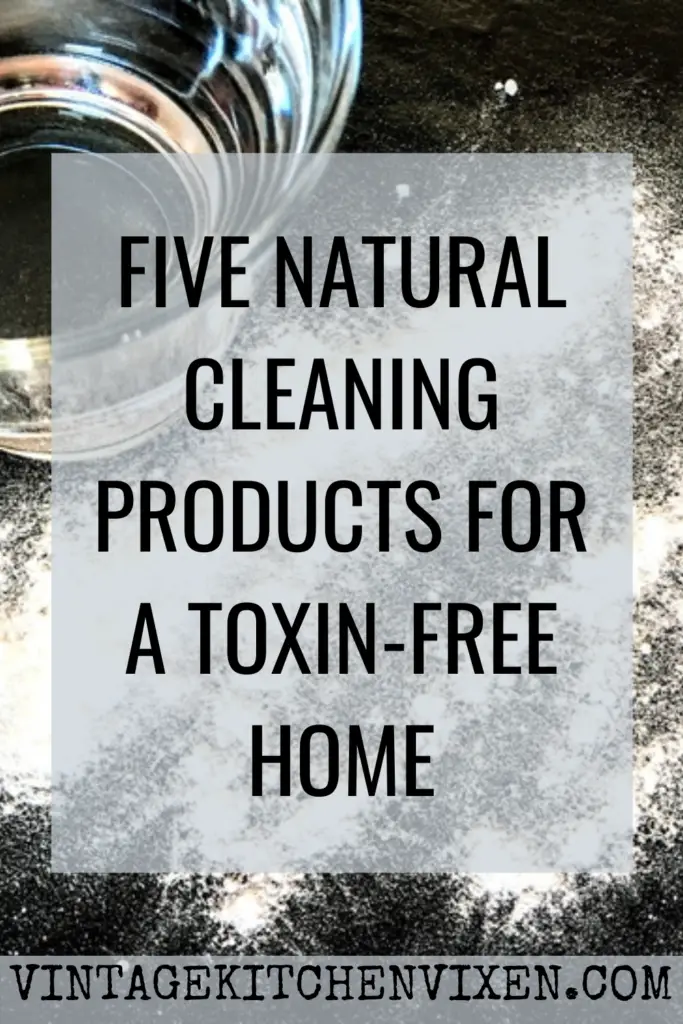
Love and gratitude,
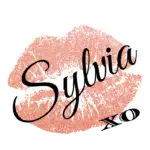

I retired from my job of 30+ years in the summer of 2019. In my newfound free time, I’m finding myself starting to revert back to the simpler cleaning ways of my grandma. For so many years the lure of quick and easy had sucked me in to things like Swiffer, etc. This post was quite interesting to me, and now I need to go stock up on some vinegar and baking soda! Thanks for sharing!
The simpler cleaning ways are so much better for us! I’ve gone through more than one Swiffer, so I know what you mean. The constant targeted marketing sure doesn’t help either! Thank you for reading 🙂
I enjoyed this post! My ‘go to’s’ are vinegar and baking soda. I love to make homemade soaps and am hoping to make more time to do it soon.
I’m so glad to hear it, thank you for reading! I really need to get into making my own soap. It’s been sitting on my list of vintage skills to learn.
We should be neighbors! I have the same value and use everythng here. I do use some fabric softner sheets (for hubby’s work clothes) but they are 100% compostable. I have been using my wool dryer balls over 10 years and they are still going strong. Mind you, some are a little wongy but that’s because I spun the wool (not the greatest spinner) so I felted dryer balls! lol You’re awesome Sylvia oxoxoxo
You say it again and again, and it’s so true, I wish we were! I love that you make your own wool dryer balls––and that you spin your own wool! You never fail to amaze me.
This is something I really need to do. I’ve always just used cleaners I can purchase at the grocery store but I’ve started thinking about how those chemicals could be affecting me and my family. Thanks for sharing this resource!!
That’s what I used to do, too! The first step to making the switch is becoming aware of what you’re exposing you and your family to, so you’re on the right track! I really recommend starting out by swapping one of your cleaners and building up from there. Thank you for reading!
I have been researching natural cleaners for a few weeks now. This post was a wealth of information. I’m excited to try some of these natural cleaners out. Thank you!
I’m so glad you found it useful! It’s easiest to take it one step at a time, replacing one synthetic product at a time with something that’s natural. Happy cleaning 🙂
So many good suggestions here! I need to cut back on some of the synthetic cleaners, that’s for sure. I’ll come back to this when I’m ready to make some natural cleaners!
Yay! Just take it one step at a time. When you’re out of dryer sheets, for instance, switch over to wool dryer balls. It removes some of the overwhelm of starting out on a new path.
Love this! Vinegar is one of my faves. I hardly use alcohol at all, but it would be my go to for something serious.
I’m the same way! I only use alcohol when raw meat has touched my kitchen counter.
Great post! I’ve really been thinking about rebooting my cleaning supplies and products lately. Thank you so much for the informative post!
Thank you, Jen! With a wee one on the way, I couldn’t think of a better time to make the switch!
Yes Yes Yes! So easy to clean your whole house naturally. Thanks for helping to get the word out — so important! Great post 🙂
Right? When you run out of all-purpose cleaning spray it takes all of 30 seconds to make a new batch as opposed to needing to run to the store. Nothing could be easier than cleaning your home naturally. Thank you for the positive reinforcement 🙂